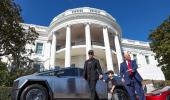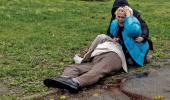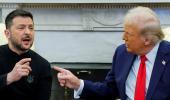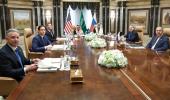'Putin dreams about his legacy. He wants to forcibly restore the Russian empire.'
'Unfortunately, after three years of large-scale war with massive human losses, Putin will not budge from his goal because human life is the cheapest resource in the Russian State.'

Nobel Laureate, human rights defender and lawyer, Oleksandra Matviichuk, was in Kyiv on February 24, 2022, when Russia launched its full-scale invasion of Ukraine.
"We knew Russian troops were gathering, of course, at our borders. We knew invasion was imminent. Our homes were no longer safe," says Matviichuk.
Amid the just concluded Black Sea security talks with Russia and Ukraine in Riyadh and as the war enters its fourth year, Matviichuk says when your country is at war you have to redefine what hope means.
"Hope is not confidence that everything will be fine, but an understanding that our efforts have huge meaning," she says.
Efforts that earned the human rights organisation Center for Civil Liberties (CCL), which she heads, the Nobel Peace Prize in 2022.
She was also awarded the Right Livelihood Award and recognised as one of the 25th influential women in the world by the Financial Times that year.
The CCL is aimed at protecting human rights and establishing democracy in Ukraine and the OSCE (Organization for Security and Co-operation in Europe) region encompasses 57 participating States from Europe, Central Asia, and North America. The OSCE is the world's largest regional security organization, working for stability, peace and democracy.
The CCL, under Matviichuk, has documented over 84,000 individual cases of war crimes since the 2022 Russo-Ukraine war, which she believes is possibly the single largest such initiative ever.
Peace, she says, is not just the absence of war -- it's about justice, human rights and dignity and with the documentation, she hopes Ukraine's future will centre around justice for the people it lost.
In the first part of an interview with Swarupa Dutt/Rediff.com, Matviichuk talks about geopolitics, peace and war, the uncertainty of waking up in the morning amid Russian drone and missile attacks, and the horrors that ordinary Ukrainians go through every day under Russian occupation.
"When you think only about economic benefits, security issues, or geopolitical interests, even if you benefit in the short term, you are biding your time for a catastrophe in the long term," Oleksandra Matviichuk says in the interview.

The United States held expert-level discussions with delegations from Russia and Ukraine in Riyadh from March 23 to 25. Discussions were held by US President Donald Trump with Russian President Vladimir Putin, and Ukrainian President Volodymyr Zelenskyy.
As a Ukrainian what is your takeaway from meetings like this? Will it bring peace?
We heard a lot about minerals, about possible territorial concessions, about NATO membership, about geopolitical interests, even about Zelenskyy's suit. [At the White House meeting on February 27, Trump asked his Ukraine counterpart, 'Oh you're all dressed up'].
But we don't hear about people. And it's not OK, because we must imbibe a human dimension into political processes around the question, 'how to end the Russian war of aggression against Ukraine?'
The human question revolves around: What will happen to the over 20,000 Ukrainian children who were legally deported to Russia?
What will happen to those separated from their families?
What will happen to the thousands and thousands of illegally detained civilians -- men and women -- subjected to daily torture and sexual abuse? What will happen to the people in the occupied areas?
Let's talk about people, because millions of Ukrainians under Russian occupation, do not have the means to protect their rights, their freedom, their property, their lives, their children, their beloved ones.
For real peace or even a ceasefire, Ukraine's western allies must think of the human dimension when these talks happen.
Yes, security guarantees are essential, there must be conversation about mineral rights, power stations, but it's shocking how little discussion there has been about people.
This is my main takeaway -- that they discussed politics, not people.

President Zelenskyy has emphasised that Ukraine is open to a ceasefire. But Putin has said there will only be a conditional ceasefire -- no arms supplies to Kiev, suspension of military mobilisation, etc.
Do you believe a ceasefire is imminent, and secondly, will the terms be favourable to Ukraine?
Unfortunately, Putin has rejected the ceasefire, which President Trump proposed.
He told President Trump that he will not hit civil infrastructure but in just two hours of that promise, I heard an air raid alarm and the sounds of explosions in Kyiv where I live.
So Putin violated his promise not to hit civilian infrastructure immediately after he gave it.
Ceasefire is the first step, but ending the aggressive war is the bigger issue.
Do you think a complete ceasefire will happen?
It depends on the power which international community can exert on Russia because a dictator works with only one logic -- they respect only strength and disrespect weakness.
Ukrainians know what ceasefire means for Russians because we already have two 'peace' agreements with the Russians.
When Russia annexed Ukrainian territory (Donetsk and Luhansk Oblasts) and Crimea in 2014, peace accords were signed in 2019, and that ceasefire was in place, when it declared war in 2022.
Russia violated the ceasefire daily before 2022, people died every day and there were no consequences for Russia.
So we know that if the international community is not able to demonstrate strength this time, a ceasefire if it happens, will mean nothing for Russians.

During that meeting at the White House on February 27, President Zelenskyy, a head of State, was severely rebuked by Trump and US Vice President J D Vance. The world reacted with disbelief and shock.
How did Ukrainians react to this unprecedented incident?
(Smiles) Oh, we were hugely emotional. It was such an important meeting on such an important topic -- how to stop this war of aggression against Ukraine -- so the politicians should have been more calm, they should have focussed on the goal of peace and ending the war and well... they should have focussed on the people.
There was just too much emotion at the White House and too little results.

IMAGE: Oleksandra Matviichuk.
Photograph: Kind courtesy Oleksandra Matviichuk
But do you agree with what Vance said at the meeting that the 'path to peace and prosperity is maybe diplomacy'. Shouldn't President Zelenskyy have gone into the meeting knowing that Trump believes Russia can be a reliable partner? The Biden bonhomie has ended; this was Trump he was talking to.
It was wishful thinking and Ukraine cannot afford wishful thinking. Maybe some politicians believe in Russia, but Ukraine cannot because we are dying.
We remember very clearly that when Russia first invaded Crimea in 2014 with the appearance of the 'little green men', Putin said they were not Russian soldiers.
It was only much later that he admitted that the men were from the Russian army.
[Picture below: The 'little green men' (a reference to the colour of their uniform) appeared during the annexation of Crimea in February 2014 by Russia. These men were highly trained soldiers, equipped with advanced Russian military gear, who quickly took control of strategic locations such as airports and government buildings in Crimea.)
(Initially, Putin denied that these forces were Russian military personnel, describing them as local self-defence units. Since these units operated without insignia, Ukraine could not respond effectively because the 'green men' blurred the lines between local militias and foreign invaders.)
I want to remind our audience that before the large-scale invasion started (February 2022) Putin and other top officials in Russia said 'we don't plan to invade Ukraine; we don't plan a large-scale war'. But it happened.
So Putin is a liar. And we can't rely on the words of a liar who violated his promises so many times because while it's probably what politicians do in peace times, you cannot afford to believe in a liar in times of large-scale war when we are dying.
What people in Ukraine know is that Putin started this war not because he wanted to occupy a part of our territory but because he wanted to occupy and destroy the whole of Ukraine and go further.
He dreams about his legacy. He wants to forcibly restore the Russian empire. His logic is historical. And the problem is that unfortunately, after three years of large-scale war with massive human losses, Putin will not budge from his goal because human life is the cheapest resource in the Russian State.
People in Ukraine want sustainable peace. It means that we have to develop and discuss security guarantees, which makes it impossible for Putin to achieve his goal.
It doesn't mean only a postponing of Putin's goal (ceasefire) for months or years.

Trump desires to end Moscow's isolation and seek a quick ceasefire. US wants stop arms support to Ukraine. By doing that, is the US weakening Europe and leaving Ukraine open to being devoured again and again?
At the White House, Zelenskyy told the US: 'you have a nice ocean and don't feel it, but you will feel it in the future.' He meant that Europe and the US will be open to Putin. How do you react?
Russia wants an empire. An empire has a centre but no borders. An empire always wants to expand; it's the nature of empire.
I interviewed hundreds of Ukrainians who survived Russian captivity, men and women, mostly civilians, and they told me how Russians see their future.
Russians believe: 'First we will occupy Ukraine and then together with you (Ukrainians), we will go to conquer other countries'.
So let's be clear, people in Europe are safe only because Ukrainians are still resistant to Russian aggression which bars Putin from entering Europe.
China, Iran, North Korea and other authoritarian regimes support Russia because they see Ukraine not as a goal but as a tool to break international order and dictate rules to entire international communities. The support of democracies like the United States, India or France must be stronger.

If the US ends war aid to Ukraine, how long do you think Ukraine will be able to hold out? And how realistic is it to expect that Europe is actually going to step up?
The US, for instance, has given you aid of around $67 billion, the UK in comparison had given 4 billion pounds.
I'm not a military expert, so excuse me for drawing on the human factor.
Three years ago, not just Putin, but the United States, France and other international partners of Ukraine also thought that it's not realistic that Ukraine could have the potential to resist such an enormous opposing power like Russia.
I was in Kyiv that day, three years ago (February 24, 2022, when Russia launched the full-scale invasion of Ukraine).
I refused to evacuate, I wanted to continue my human rights work on the ground, and I remember how international organisations and embassies evacuated their personnel.
They left us all alone. They didn't believe that we have the potential to stop the Russians.
Ordinary people remained in Kyiv and it was ordinary people who helped others survive under artillery fire.
Ordinary people brought victims out of ruined cities and flaming buildings. Ordinary people broke through the encirclement to provide humanitarian aid.
And suddenly it became obvious to everyone that when millions of ordinary people start to fight for their freedom and human dignity they can emerge so strong that even the second largest army (Russian) in the world cannot defeat it. And while our international partners thought that Ukraine can resist only for three or four days, we are still resisting Russia. This is the fourth year.
In fact, it's not rational comparing Ukraine and Russia because Russia has veto power in the UN, oil and gas -- which means a lot of money, nuclear weapons and a strong military.
But what we learnt is that we can't underestimate the human spirit, because ordinary people have much more impact that they can even imagine.
The mass mobilisation of ordinary people can change history as we have seen in India with Mahatma Gandhi; in the United States with Martin Luther King.
You have to believe in your own people; authoritarian leaders don't.

A popular meme shows European nations egging Ukraine on to poke the bear, Russia. And how, when it retaliates and Ukraine bears the brunt of it, those European nations are absent. Will Europe stand up for Ukraine in the absence of the US?
Europe has to play a more proactive role, not just for Ukrainians, but pragmatically, because we share a common European security.
Ukrainians know the Russian language very well because we were part of the Russian empire for centuries.
We can follow how Russians openly discussed on TV which is the next country they will attack.
It will be Poland or it will be Estonia, they have said. So Europe has no choice but to get involved, not just for Ukraine, but for its own sakes.

The US has proposed to sign a major mineral and a nuclear power plant deal with Ukraine. The White House says the deal is a way for US to recoup the financial aid given to Kyiv since the start of Russia's full-scale invasion. Do concessions dilute your sovereignty?
As I said in the beginning, I'm upset that politicians discuss mineral rights but not human lives, because President Trump has publicly said that he wants to bring peace because he cared about people dying in this war.
It has to therefore mean that he also cares about people dying in Russian prisons.
Let me give you one example that I came across as human rights lawyer documenting Russian war crimes in this country.
This is the story of children's writer Volodymyr Vakulenko who wrote beautiful stories that an entire generation of Ukrainian children were brought up on.
He disappeared during the Russian occupation. His family hoped till the end that he was alive like the other thousands and thousands of civilian men and women who are in Russian captivity.
But when the Ukrainian army liberated the Kharkiv region, they found mass graves in a forest with bodies of men, women and children.
Under the number 319, we found the body of this writer. You could ask me why would Russians kill a children's book writer?
The answer is simple: Because they could. And this is something which going on this very second as we speak, in the occupied territories. And this is what I want politician to discuss -- human beings, not minerals.
I know I will probably sound naive, but when you think only about economic benefits, security issues or geopolitical interests, even if you benefit in the short term, you are biding your time for a catastrophe in the long term because if Russia gets what Putin wants and he remains unpunished, it will encourage authoritarian regimes like, say, China to embark on similar invasions.
Is President Zelenskyy the right person to lead Ukraine at this juncture?
I think Ukraine will hold elections when we are secure and it is only the people who can answer this question.
Feature Presentation: Rajesh Alva/Rediff.com











 © 2025
© 2025